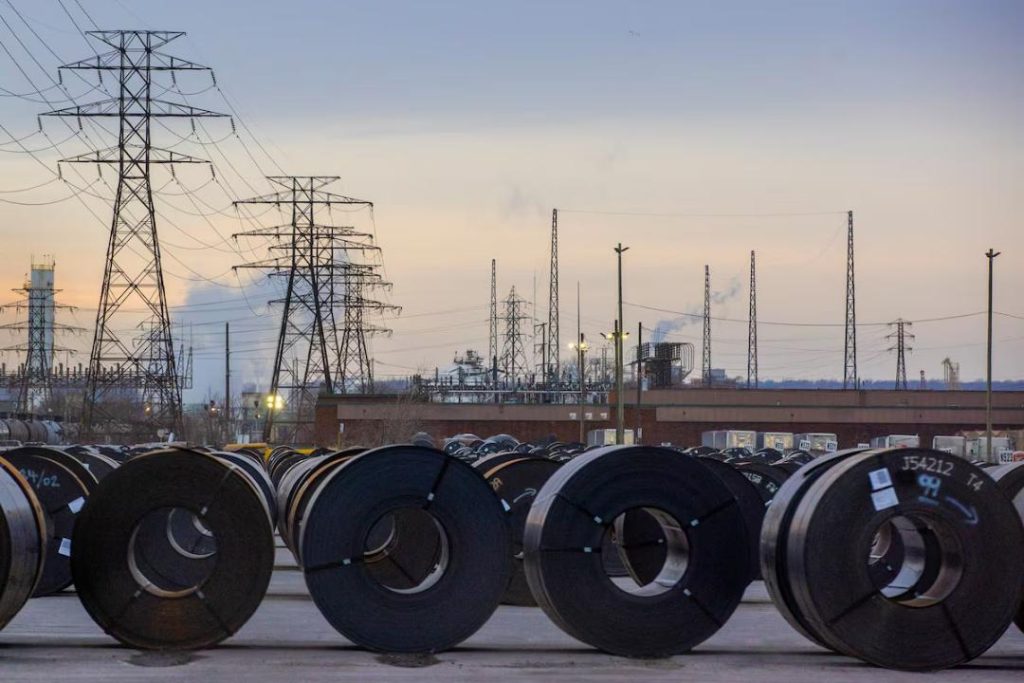
US Tariffs Hit Canada’s Steel & Aluminum Industry, Job Cuts Begin
The ongoing trade tensions between the United States and Canada have taken a toll on Canada’s steel and aluminum industry, with at least 200 workers affected by job losses. The tariffs imposed by the US on steel and aluminum imports have led to a significant downturn in the industry, resulting in widespread job cuts.
According to Marty Warren, National Director of the United Steelworkers, the situation is dire, with many workers facing uncertainty about their future. “The US tariffs are having a devastating impact on our industry, and it’s not just the direct jobs that are being lost, but also the indirect jobs that rely on the steel and aluminum industry,” Warren said.
One of the companies that has been hit hardest by the tariffs is Canada Metal Processing Group, which has cut 140 jobs due to the “threat of incoming tariffs.” The company, which produces steel and aluminum products, had previously invested heavily in its operations, but the tariffs have made it difficult to compete with US imports.
The tariffs, which were imposed by the US in June 2018, were meant to protect the US steel and aluminum industries from what the Trump administration deemed to be unfair trade practices by other countries, including Canada and Mexico. However, the move has had unintended consequences for Canada’s steel and aluminum industry, which relies heavily on exports to the US.
The impact of the tariffs has been felt across the industry, with many companies struggling to stay afloat. The Canadian Steel Producers Association has estimated that the tariffs have resulted in a significant loss of market share for Canadian steel producers, with many companies forced to reduce production and lay off workers.
The situation is likely to worsen in the coming months, as the US is set to impose additional tariffs on steel and aluminum imports on April 2. The tariffs, which will apply to a range of steel and aluminum products, including pipes, tubes, and wire rods, are expected to further exacerbate the decline of the industry.
Economists warn that the fallout from the tariffs will be far-reaching, with many industries beyond steel and aluminum likely to be affected. “The tariffs are not just a problem for the steel and aluminum industry, but also for other industries that rely on those products,” said Ian Lee, an economist at Carleton University. “The impact will be felt across the economy, and it will take a long time to recover from this.”
The job cuts and industry decline have also had a significant impact on local communities, where many workers have been left without employment. “The impact of the tariffs on our community has been devastating,” said Warren. “Many workers have been forced to leave their homes and their families to find work in other parts of the country. It’s a tragedy that should not have happened.”
The situation has also raised concerns about the long-term viability of the steel and aluminum industry in Canada. Many companies are struggling to remain competitive, and the tariffs have made it difficult for them to invest in new equipment and technology.
The Canadian government has urged the US to lift the tariffs, citing the negative impact they have had on the industry. “The tariffs are having a devastating impact on our industry, and we urge the US to lift them as soon as possible,” said a government spokesperson. “We are committed to supporting our steel and aluminum industry and helping it to recover from this crisis.”
In conclusion, the US tariffs on steel and aluminum have had a significant impact on Canada’s steel and aluminum industry, resulting in job losses and a decline in production. The situation is likely to worsen in the coming months, as additional tariffs are set to be imposed. The fallout from the tariffs will be far-reaching, with many industries and communities likely to be affected. The Canadian government and industry leaders are urging the US to lift the tariffs, in the hope that the industry can recover and thrive once again.






